中考英语复习语法突破第九节被动语态课件(共41张PPT)
文档属性
| 名称 | 中考英语复习语法突破第九节被动语态课件(共41张PPT) |

|
|
| 格式 | ppt | ||
| 文件大小 | 494.0KB | ||
| 资源类型 | 教案 | ||
| 版本资源 | 通用版 | ||
| 科目 | 英语 | ||
| 更新时间 | 2024-03-01 00:00:00 | ||
图片预览

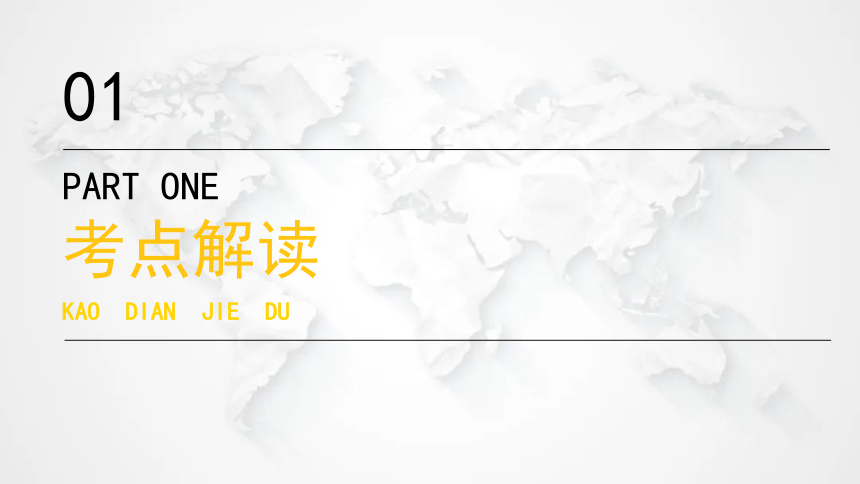
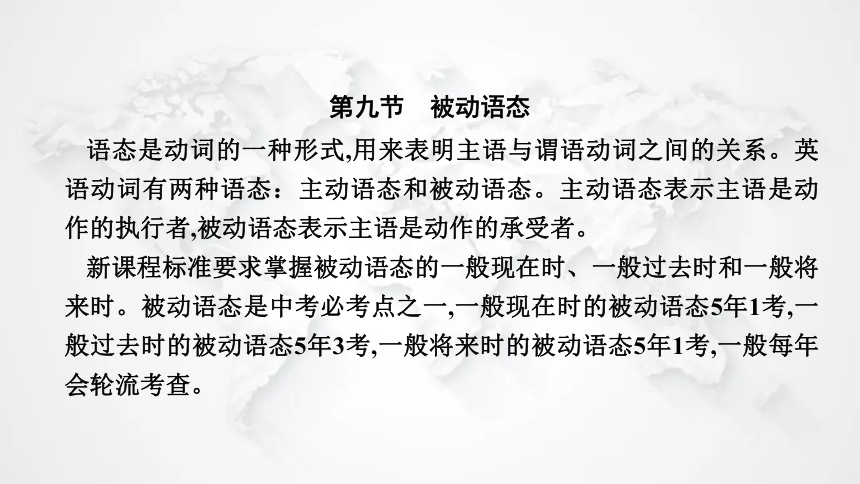

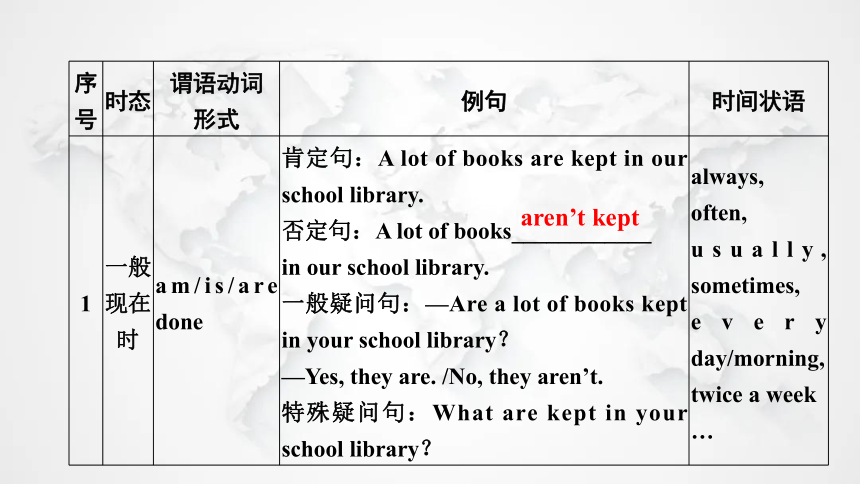
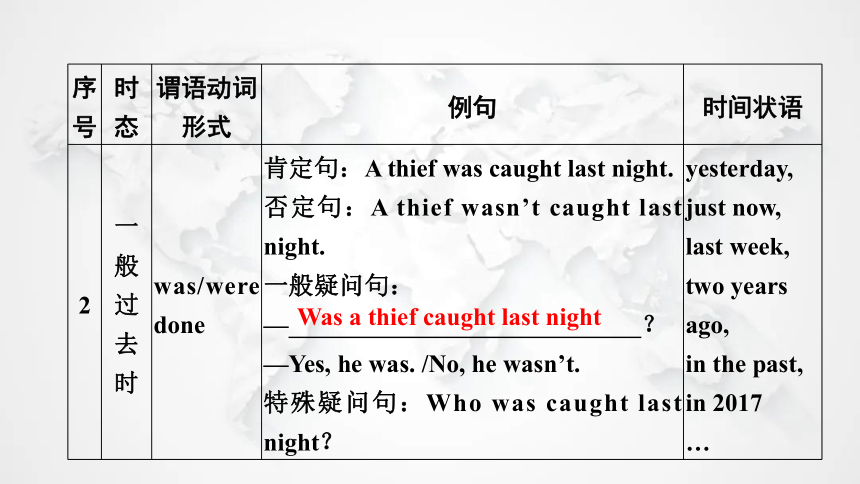
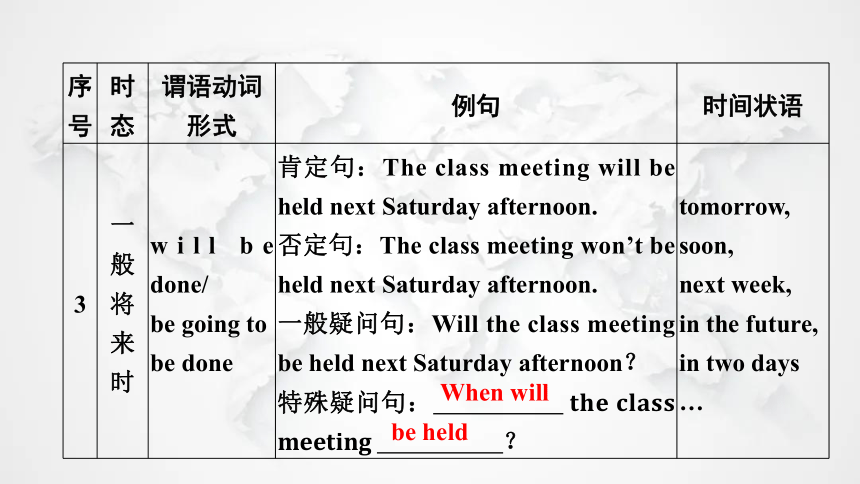
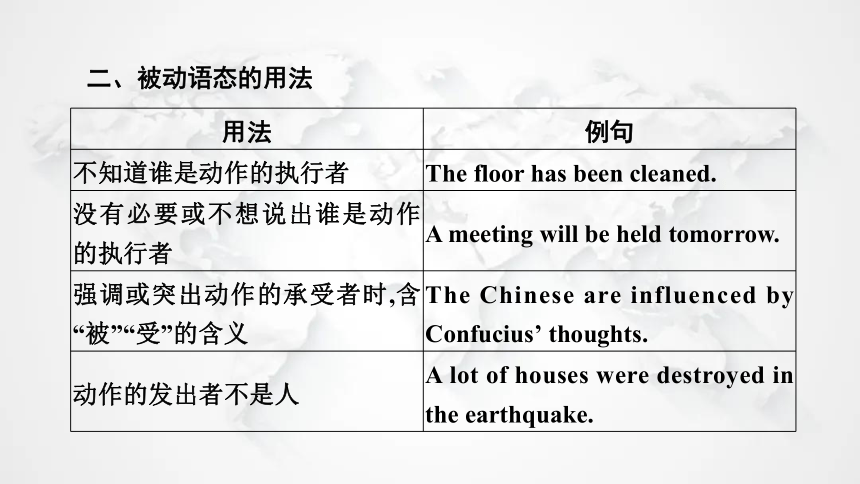
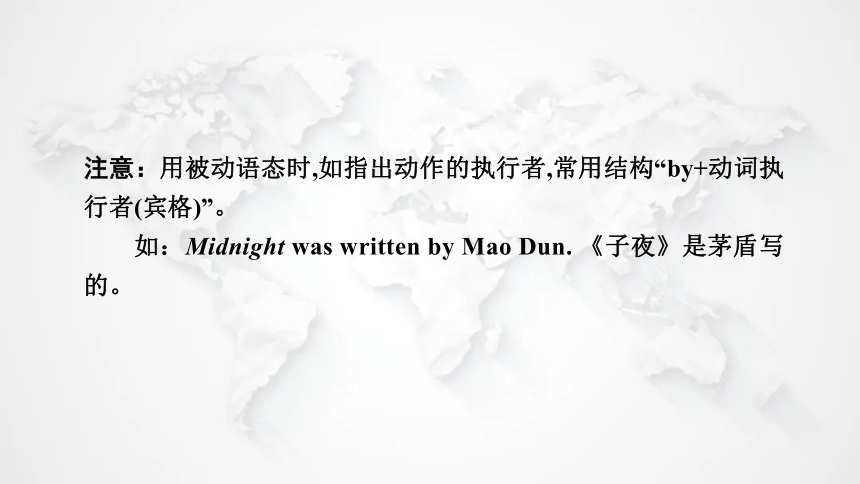
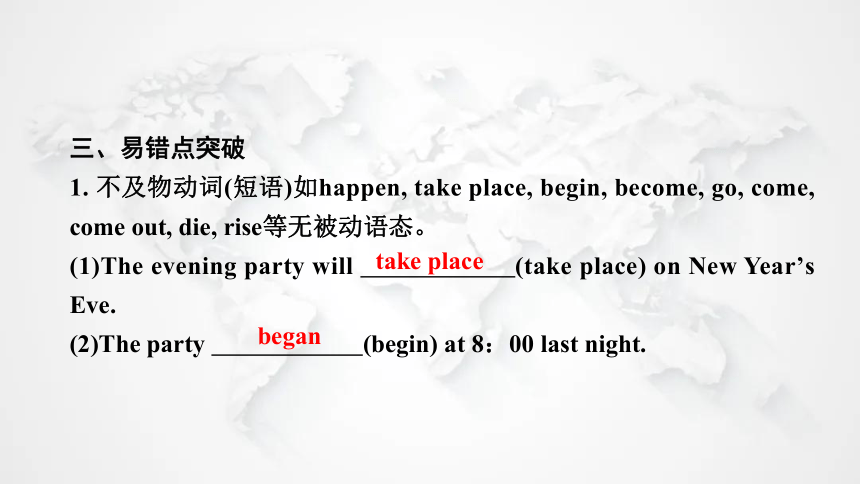
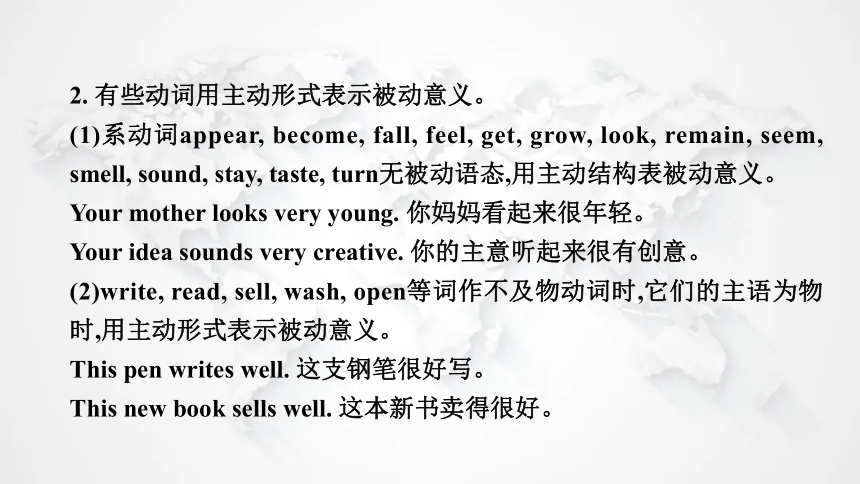

文档简介
(共41张PPT)
考点解读
01
KAO DIAN JIE DU
满分突破
02
MAN FEN TU PO
真题链接
03
ZHEN TI LIAN JIE
CONTENTS
目录
模拟突破
04
MO NI TU PO
考点解读
KAO DIAN JIE DU
PART ONE
01
第九节 被动语态
语态是动词的一种形式,用来表明主语与谓语动词之间的关系。英语动词有两种语态:主动语态和被动语态。主动语态表示主语是动作的执行者,被动语态表示主语是动作的承受者。
新课程标准要求掌握被动语态的一般现在时、一般过去时和一般将来时。被动语态是中考必考点之一,一般现在时的被动语态5年1考,一般过去时的被动语态5年3考,一般将来时的被动语态5年1考,一般每年会轮流考查。
一、被动语态的构成
被动语态由“be+动词的过去分词”构成,助动词be有人称、数和时态的变化,其变化规则与be作为系动词的变化完全一样。
序号 时态 谓语动词
形式 例句 时间状语
1 一般
现在时 am/is/are done 肯定句:A lot of books are kept in our school library.
否定句:A lot of books____________
in our school library.
一般疑问句:—Are a lot of books kept in your school library?
—Yes, they are. /No, they aren’t.
特殊疑问句:What are kept in your school library? always,
often,
usually, sometimes,
every day/morning,
twice a week
…
aren’t kept
序号 时态 谓语动词
形式 例句 时间状语
2 一般
过去时 was/were done 肯定句:A thief was caught last night.
否定句:A thief wasn’t caught last night.
一般疑问句:
— ?
—Yes, he was. /No, he wasn’t.
特殊疑问句:Who was caught last night? yesterday, just now, last week,
two years ago,
in the past,
in 2017
…
Was a thief caught last night
序号 时态 谓语动词
形式 例句 时间状语
3 一般
将来时 will be done/
be going to
be done 肯定句:The class meeting will be held next Saturday afternoon.
否定句:The class meeting won’t be held next Saturday afternoon.
一般疑问句:Will the class meeting be held next Saturday afternoon?
特殊疑问句: the class meeting ? tomorrow,
soon,
next week,
in the future,
in two days
…
When will
be held
二、被动语态的用法
用法 例句
不知道谁是动作的执行者 The floor has been cleaned.
没有必要或不想说出谁是动作的执行者 A meeting will be held tomorrow.
强调或突出动作的承受者时,含“被”“受”的含义 The Chinese are influenced by Confucius’ thoughts.
动作的发出者不是人 A lot of houses were destroyed in the earthquake.
注意:用被动语态时,如指出动作的执行者,常用结构“by+动词执行者(宾格)”。
如:Midnight was written by Mao Dun. 《子夜》是茅盾写的。
三、易错点突破
1. 不及物动词(短语)如happen, take place, begin, become, go, come, come out, die, rise等无被动语态。
(1)The evening party will (take place) on New Year’s Eve.
(2)The party (begin) at 8:00 last night.
take place
began
2. 有些动词用主动形式表示被动意义。
(1)系动词appear, become, fall, feel, get, grow, look, remain, seem, smell, sound, stay, taste, turn无被动语态,用主动结构表被动意义。
Your mother looks very young. 你妈妈看起来很年轻。
Your idea sounds very creative. 你的主意听起来很有创意。
(2)write, read, sell, wash, open等词作不及物动词时,它们的主语为物时,用主动形式表示被动意义。
This pen writes well. 这支钢笔很好写。
This new book sells well. 这本新书卖得很好。
(3)need, want, require等词后加动词-ing,相当于动词不定式的被动形式,即need/want/require doing=need/want/require to be done。
The house needs repairing. =The house needs to be repaired. 这房子需要修理。
(4)be worth doing 用主动形式表被动意义。This book is worth reading. 这本书值得一读。
3. 表示客观的说明常用“It is+过去分词+that从句”句型或“主语+be+过去分词+to do sth. ”。这类句型有:
It is said that … 据说…… It is reported that … 据报道……
It is believed that … 大家相信…… It is hoped that … 大家希望……
It is well-known that … 众所周知…… It is thought that … 大家认为……
It is suggested that … 据建议……
(1) (据报道) that an airplane disappeared in March.
(2) (众所周知) that Mary will move to the USA.
It is reported
It is well-known
4. 被动语态后面动词形式的选择
主动句中的感官动词see, hear, watch, feel, notice等,使役动词let, make, have 等,后跟省略to的不定式做宾语补足语,变为被动句时要加上to。
(1)He was seen (steal) money last night.
(2)Kate is heard (play) the piano every evening.
to steal
to play
5. 动词短语变成被动语态时,必须保留其后的介词或副词。如:
The nurse takes good care of the sick man. → The sick man is taken good care of by the nurse.
(1)We can’t laugh at him. → He can’t by us.
(2)He looks after his grandparents well. → His grandparents _______
well by him.
be laughed at
are looked after
6. 含有双宾语的句子变成被动语态时,有两种形式:
(1)直接宾语变成被动语态的主语时,间接宾语前要加to/for。如:
He gave me a book yesterday. → A book was given to me yesterday.
My father bought me a bike last week. → A bike was bought for me by my father last week.
(2)间接宾语变成被动语态的主语。如:
My friend told me a story. → I was told a story by my friend.
7. 被动语态和系表结构的区别
(1)被动语态表示主语为承受者时所承受的动作;而系表结构则表示主语的特点或所处的状态。
This shop is closed at nine o’clock. (动作) 这家商店9点关门。
This shop is closed today. (状态)这家商店今天不营业。
(2)系表结构中的过去分词常有固定的介词搭配,被动语态结构中则没有。
Miss Tang is satisfied with us. (系表结构)唐老师对我们很满意。
(3)系表结构中的过去分词可以被副词修饰。
He is so worried about his exam. (系表结构)他非常担心他的考试。
(4)系表结构通常只有一般现在时和一般过去时,而被动语态结构则可用于多种时态。
满分突破
MAN FEN TU PO
PART TWO
02
一、被动语态在语法选择中的考查
被动语态基本每年都考查,但是又属于学生们失分比较多的考点。做题时先观察选项,可以先确定哪一题考查被动语态,然后根据主语的单复数和前后文的时态确定答案。被动语态的结构为:be+动词的过去分词,注意be动词的时态和数的变化。
1. (2023·广东中考·8题)At the age of seven, David had his first astronaut (宇航员) training experience. He and his parents________ to a Family Space Camp.
A. invited B. are invited C. were invited
C
2. (2023·广州中考·3题)But the last one that came out was not strong at all. This little one Little Six.
A. called B. was calling
C. was called D. were called
C
3. (2022· 广东中考·37题)Students in the school to get up at 6:45 a. m. to practice their basic skills, but Wang got up at 6:00 in the morning.
A. ask B. asked C. were asked
C
4. (2021·广东中考·39题)Some people to check out the bridge before the opening. Jerry was one of them.
A. are inviting B. are invited
C. were invited D. were inviting
C
5. (2021·广州中考·14题)The corn — all because one little raindrop tried its best to do what it could.
A. save B. saved C. is saved D. was saved
D
6. (2023·阳江市一模)Many people by Oliver’s story and they give away free materials to him.
A. are encouraged
B. are encouraging
C. have encouraged
A
二、被动语态在短文填空中的考查
在短文填空中,被动语态比较少设置考题,近五年仅考查过一次,考查的是一般过去时的被动语态,可根据主语和谓语之间的关系判断。
(2023·汕头市一模) Mom said that the Chinese fan was a good choice, for Chinese is as “the Fan Kingdom”.
known / regarded / seen / thought / considered
真题链接
ZHEN TI LIAN JIE
PART THREE
03
( )1. Breakfast every day for people aged over 60 for free in this village.
(2023·河北省)
A. provides B. provided C. is provided D. was provided
( )2. — The panda Ya Ya back to China on April 27th,2023. (2023·岳阳市)
A. is brought B. was brought C. will be brought
C
B
( )3. Some photos of the moon in the Space Club next week. (2023·天津市)
A. shows B. is showing C. were shown D. will be shown
( )4. Computers have had a great influence on learning methods since they into schools. (2023·安徽省)
A. introduce B. Introduced
C. are introduced D. were introduced
D
D
( )5. Sand turns to glass when it by lightning. (2023·扬州市)
A. hits B. is hit C. is hitting D. will be hit
B
( )6. — Would you mind telling me if he the meeting in two days?
— He won’t, unless he . (2023·达州市)
A. will attend; is invited
B. attends; will be invited
C. will attend; invites
A
( )7. Hou Yi magic medicine for shooting down the nine suns, then Pang Meng tried to steal it. (2023·江西省)
A. gives B. has given C. gave D. was given
( )8. To make the environment much better, more trees
next year.
(2023·连云港市)
A. plant B. will plant C. are planted D. will be planted
D
D
( )9. — Hanfu lovers walking down the street in many cities.
— Well, wearing hanfu helps to understand the Chinese culture.
(2023·新疆维吾尔自治区)
A. can be found B. can find
C. must be found D. must find
A
( )10. — Students a few open questions in Ms. Li’s class, did you notice that?
— Yes, I think she wanted to train their ability of creative thinking. (2023·营口市)
A. are asked B. were asked
C. will be asked D. should be asked
B
模拟突破
MO NI TU PO
PART FOUR
04
语法选择(2023·揭阳市一模)
Chinese kung fu is known as Chinese martial arts (武术). It is 1 important part of traditional Chinese culture. And it is probably one of 2 sports with a long history.
Chinese kung fu dates back to the ancient society. At that time, people used sticks 3 against wild animals. Gradually, they learned to protect 4 . During the Shang Dynasty, soldiers 5 in the form of kung fu. So far, the term “kung fu” 6 a number of fighting styles. The most famous ones are tai chi, Shaolin kung fu and qigong.
7 it is about fighting, Chinese kung fu stands for peace instead of violence (暴力). It has to do with exercise, self-protection and fitness. Nowadays, kung fu is getting much more popular 8 people and even becomes a symbol of Chinese culture. This traditional sport has really had much influence on Chinese people’s lifestyle.
The most famous kung fu star is certainly Bruce Lee! He performed 9 in Chinese kung fu and made it known throughout the world. 10 successful man he is! What’s more, his skills have been kept alive by actors like Jet Li and Jackie Chan.
( )1. A. a B. an C. the
( )2. A. old B. older C. the oldest
( )3. A. to fight B. fighting C. fought
( )4. A. them B. themselves C. their
( )5. A. trained B. are trained C. were trained
( )6. A. has covered B. covered C. is covering
( )7. A. Because B. Unless C. Although
( )8. A. for B. among C. on
( )9. A. excellent B. excellently C. excellence
( )10. A. What an B. How C. What a
B
C
A
B
C
A
C
B
B
C
考点解读
01
KAO DIAN JIE DU
满分突破
02
MAN FEN TU PO
真题链接
03
ZHEN TI LIAN JIE
CONTENTS
目录
模拟突破
04
MO NI TU PO
考点解读
KAO DIAN JIE DU
PART ONE
01
第九节 被动语态
语态是动词的一种形式,用来表明主语与谓语动词之间的关系。英语动词有两种语态:主动语态和被动语态。主动语态表示主语是动作的执行者,被动语态表示主语是动作的承受者。
新课程标准要求掌握被动语态的一般现在时、一般过去时和一般将来时。被动语态是中考必考点之一,一般现在时的被动语态5年1考,一般过去时的被动语态5年3考,一般将来时的被动语态5年1考,一般每年会轮流考查。
一、被动语态的构成
被动语态由“be+动词的过去分词”构成,助动词be有人称、数和时态的变化,其变化规则与be作为系动词的变化完全一样。
序号 时态 谓语动词
形式 例句 时间状语
1 一般
现在时 am/is/are done 肯定句:A lot of books are kept in our school library.
否定句:A lot of books____________
in our school library.
一般疑问句:—Are a lot of books kept in your school library?
—Yes, they are. /No, they aren’t.
特殊疑问句:What are kept in your school library? always,
often,
usually, sometimes,
every day/morning,
twice a week
…
aren’t kept
序号 时态 谓语动词
形式 例句 时间状语
2 一般
过去时 was/were done 肯定句:A thief was caught last night.
否定句:A thief wasn’t caught last night.
一般疑问句:
— ?
—Yes, he was. /No, he wasn’t.
特殊疑问句:Who was caught last night? yesterday, just now, last week,
two years ago,
in the past,
in 2017
…
Was a thief caught last night
序号 时态 谓语动词
形式 例句 时间状语
3 一般
将来时 will be done/
be going to
be done 肯定句:The class meeting will be held next Saturday afternoon.
否定句:The class meeting won’t be held next Saturday afternoon.
一般疑问句:Will the class meeting be held next Saturday afternoon?
特殊疑问句: the class meeting ? tomorrow,
soon,
next week,
in the future,
in two days
…
When will
be held
二、被动语态的用法
用法 例句
不知道谁是动作的执行者 The floor has been cleaned.
没有必要或不想说出谁是动作的执行者 A meeting will be held tomorrow.
强调或突出动作的承受者时,含“被”“受”的含义 The Chinese are influenced by Confucius’ thoughts.
动作的发出者不是人 A lot of houses were destroyed in the earthquake.
注意:用被动语态时,如指出动作的执行者,常用结构“by+动词执行者(宾格)”。
如:Midnight was written by Mao Dun. 《子夜》是茅盾写的。
三、易错点突破
1. 不及物动词(短语)如happen, take place, begin, become, go, come, come out, die, rise等无被动语态。
(1)The evening party will (take place) on New Year’s Eve.
(2)The party (begin) at 8:00 last night.
take place
began
2. 有些动词用主动形式表示被动意义。
(1)系动词appear, become, fall, feel, get, grow, look, remain, seem, smell, sound, stay, taste, turn无被动语态,用主动结构表被动意义。
Your mother looks very young. 你妈妈看起来很年轻。
Your idea sounds very creative. 你的主意听起来很有创意。
(2)write, read, sell, wash, open等词作不及物动词时,它们的主语为物时,用主动形式表示被动意义。
This pen writes well. 这支钢笔很好写。
This new book sells well. 这本新书卖得很好。
(3)need, want, require等词后加动词-ing,相当于动词不定式的被动形式,即need/want/require doing=need/want/require to be done。
The house needs repairing. =The house needs to be repaired. 这房子需要修理。
(4)be worth doing 用主动形式表被动意义。This book is worth reading. 这本书值得一读。
3. 表示客观的说明常用“It is+过去分词+that从句”句型或“主语+be+过去分词+to do sth. ”。这类句型有:
It is said that … 据说…… It is reported that … 据报道……
It is believed that … 大家相信…… It is hoped that … 大家希望……
It is well-known that … 众所周知…… It is thought that … 大家认为……
It is suggested that … 据建议……
(1) (据报道) that an airplane disappeared in March.
(2) (众所周知) that Mary will move to the USA.
It is reported
It is well-known
4. 被动语态后面动词形式的选择
主动句中的感官动词see, hear, watch, feel, notice等,使役动词let, make, have 等,后跟省略to的不定式做宾语补足语,变为被动句时要加上to。
(1)He was seen (steal) money last night.
(2)Kate is heard (play) the piano every evening.
to steal
to play
5. 动词短语变成被动语态时,必须保留其后的介词或副词。如:
The nurse takes good care of the sick man. → The sick man is taken good care of by the nurse.
(1)We can’t laugh at him. → He can’t by us.
(2)He looks after his grandparents well. → His grandparents _______
well by him.
be laughed at
are looked after
6. 含有双宾语的句子变成被动语态时,有两种形式:
(1)直接宾语变成被动语态的主语时,间接宾语前要加to/for。如:
He gave me a book yesterday. → A book was given to me yesterday.
My father bought me a bike last week. → A bike was bought for me by my father last week.
(2)间接宾语变成被动语态的主语。如:
My friend told me a story. → I was told a story by my friend.
7. 被动语态和系表结构的区别
(1)被动语态表示主语为承受者时所承受的动作;而系表结构则表示主语的特点或所处的状态。
This shop is closed at nine o’clock. (动作) 这家商店9点关门。
This shop is closed today. (状态)这家商店今天不营业。
(2)系表结构中的过去分词常有固定的介词搭配,被动语态结构中则没有。
Miss Tang is satisfied with us. (系表结构)唐老师对我们很满意。
(3)系表结构中的过去分词可以被副词修饰。
He is so worried about his exam. (系表结构)他非常担心他的考试。
(4)系表结构通常只有一般现在时和一般过去时,而被动语态结构则可用于多种时态。
满分突破
MAN FEN TU PO
PART TWO
02
一、被动语态在语法选择中的考查
被动语态基本每年都考查,但是又属于学生们失分比较多的考点。做题时先观察选项,可以先确定哪一题考查被动语态,然后根据主语的单复数和前后文的时态确定答案。被动语态的结构为:be+动词的过去分词,注意be动词的时态和数的变化。
1. (2023·广东中考·8题)At the age of seven, David had his first astronaut (宇航员) training experience. He and his parents________ to a Family Space Camp.
A. invited B. are invited C. were invited
C
2. (2023·广州中考·3题)But the last one that came out was not strong at all. This little one Little Six.
A. called B. was calling
C. was called D. were called
C
3. (2022· 广东中考·37题)Students in the school to get up at 6:45 a. m. to practice their basic skills, but Wang got up at 6:00 in the morning.
A. ask B. asked C. were asked
C
4. (2021·广东中考·39题)Some people to check out the bridge before the opening. Jerry was one of them.
A. are inviting B. are invited
C. were invited D. were inviting
C
5. (2021·广州中考·14题)The corn — all because one little raindrop tried its best to do what it could.
A. save B. saved C. is saved D. was saved
D
6. (2023·阳江市一模)Many people by Oliver’s story and they give away free materials to him.
A. are encouraged
B. are encouraging
C. have encouraged
A
二、被动语态在短文填空中的考查
在短文填空中,被动语态比较少设置考题,近五年仅考查过一次,考查的是一般过去时的被动语态,可根据主语和谓语之间的关系判断。
(2023·汕头市一模) Mom said that the Chinese fan was a good choice, for Chinese is as “the Fan Kingdom”.
known / regarded / seen / thought / considered
真题链接
ZHEN TI LIAN JIE
PART THREE
03
( )1. Breakfast every day for people aged over 60 for free in this village.
(2023·河北省)
A. provides B. provided C. is provided D. was provided
( )2. — The panda Ya Ya back to China on April 27th,2023. (2023·岳阳市)
A. is brought B. was brought C. will be brought
C
B
( )3. Some photos of the moon in the Space Club next week. (2023·天津市)
A. shows B. is showing C. were shown D. will be shown
( )4. Computers have had a great influence on learning methods since they into schools. (2023·安徽省)
A. introduce B. Introduced
C. are introduced D. were introduced
D
D
( )5. Sand turns to glass when it by lightning. (2023·扬州市)
A. hits B. is hit C. is hitting D. will be hit
B
( )6. — Would you mind telling me if he the meeting in two days?
— He won’t, unless he . (2023·达州市)
A. will attend; is invited
B. attends; will be invited
C. will attend; invites
A
( )7. Hou Yi magic medicine for shooting down the nine suns, then Pang Meng tried to steal it. (2023·江西省)
A. gives B. has given C. gave D. was given
( )8. To make the environment much better, more trees
next year.
(2023·连云港市)
A. plant B. will plant C. are planted D. will be planted
D
D
( )9. — Hanfu lovers walking down the street in many cities.
— Well, wearing hanfu helps to understand the Chinese culture.
(2023·新疆维吾尔自治区)
A. can be found B. can find
C. must be found D. must find
A
( )10. — Students a few open questions in Ms. Li’s class, did you notice that?
— Yes, I think she wanted to train their ability of creative thinking. (2023·营口市)
A. are asked B. were asked
C. will be asked D. should be asked
B
模拟突破
MO NI TU PO
PART FOUR
04
语法选择(2023·揭阳市一模)
Chinese kung fu is known as Chinese martial arts (武术). It is 1 important part of traditional Chinese culture. And it is probably one of 2 sports with a long history.
Chinese kung fu dates back to the ancient society. At that time, people used sticks 3 against wild animals. Gradually, they learned to protect 4 . During the Shang Dynasty, soldiers 5 in the form of kung fu. So far, the term “kung fu” 6 a number of fighting styles. The most famous ones are tai chi, Shaolin kung fu and qigong.
7 it is about fighting, Chinese kung fu stands for peace instead of violence (暴力). It has to do with exercise, self-protection and fitness. Nowadays, kung fu is getting much more popular 8 people and even becomes a symbol of Chinese culture. This traditional sport has really had much influence on Chinese people’s lifestyle.
The most famous kung fu star is certainly Bruce Lee! He performed 9 in Chinese kung fu and made it known throughout the world. 10 successful man he is! What’s more, his skills have been kept alive by actors like Jet Li and Jackie Chan.
( )1. A. a B. an C. the
( )2. A. old B. older C. the oldest
( )3. A. to fight B. fighting C. fought
( )4. A. them B. themselves C. their
( )5. A. trained B. are trained C. were trained
( )6. A. has covered B. covered C. is covering
( )7. A. Because B. Unless C. Although
( )8. A. for B. among C. on
( )9. A. excellent B. excellently C. excellence
( )10. A. What an B. How C. What a
B
C
A
B
C
A
C
B
B
C
同课章节目录
- 词法
- 名词
- 动词和动词短语
- 动词语态
- 动词时态
- 助动词和情态动词
- 非谓语动词
- 冠词
- 代词
- 数词和量词
- 形容词副词及其比较等级
- 介词和介词短语
- 连词和感叹词
- 构词法
- 相似、相近词比较
- 句法
- 陈述句
- 一般疑问句和否定疑问句
- 特殊疑问句及选择疑问句
- 反意疑问句
- 存在句(There be句型)
- 宾语从句
- 定语从句
- 状语从句
- 主谓一致问题
- 简单句
- 并列句
- 复合句
- 主谓一致
- 主、表语从句
- 名词性从句
- 直接引语和间接引语
- 虚拟语气
- 感叹句
- 强调句
- 倒装句
- 祈使句
- 句子的成分
- 句子的分类
- 题型专区
- 单项选择部分
- 易错题
- 完形填空
- 阅读理解
- 词汇练习
- 听说训练
- 句型转换
- 补全对话
- 短文改错
- 翻译
- 书面表达
- 任务型阅读
- 语法填空
- 其他资料
